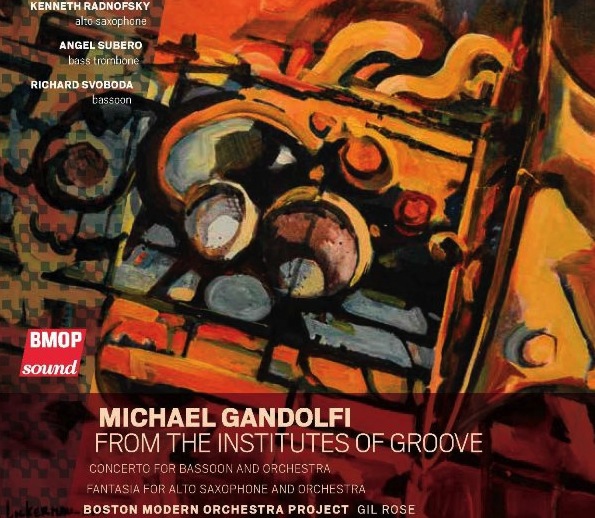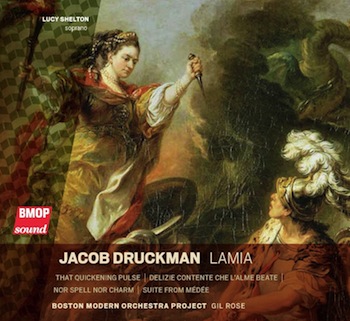Classical CD Reviews: Michael Gandolfi’s From the Institutes of Groove and Jacob Druckman’s Lamia (BMOP Sound)
Gil Rose and the Boston Modern Orchestra Project (BMOP) have been on something of a recording tear of late.
By Jonathan Blumhofer
Since last fall, Gil Rose and the Boston Modern Orchestra Project have released half a dozen new albums of orchestral music by American composers on their in-house label, BMOP/sound, and the release schedule shows no let-up heading into this autumn. Their two most recent discs, From the Institutes of Groove (with music by Michael Gandolfi) and Lamia (featuring music by Jacob Druckman) continue the orchestra’s trend of terrific playing of challenging repertoire and do much to fill holes in the discography of contemporary American music.
Michael Gandolfi is no stranger to local audiences: chair of the composition department at the New England Conservatory, his music turns up widely and often in the greater Boston area. He’s a prolific composer and his background in popular music helps ensure that most of his “classical” compositions are audience friendly, to say the least. The latter point is ultimately a good thing, though nearly every composer who writes lots of notes has their share of clunkers.
Unfortunately, the album’s title piece, From the Institutes of Groove, is one of those misses. It’s an intriguing concept: a concerto for bass trombone and orchestra that celebrates the mixed classical and salsa background of its dedicatee, Angel Subero. It also features movements with intriguing titles: “Too Jazz for Rock” and “Rising on the Wing (Perpetuum mobile),” respectively. However, the music never really lives up to those titles. There are big band-ish riffs and salsa rhythms in the first movement, and sputtering Minimalist patterns in the second, but none of it feels really convincing and the musical material is largely forgettable: it’s a piece that seems to be building for some climax or attempting to make some big statement, but it doesn’t deliver on either count. Subero navigates all its potential pitfalls with great agility and there’s nothing wrong with BMOP’s playing; even so, From the Institutes of Groove doesn’t make a strong, positive impression.
More successful is Gandolfi’s Bassoon Concerto, written for Boston Symphony principal bassoon Richard Svoboda. In it, Gandolfi reimagines the Classical concerto of Haydn, though rhythmically a bit trickier and more harmonically pungent. It’s a terrific showpiece for the instrument and Svoboda plays the daylights out of it, reveling in its quirky humor and plumbing the depths of the slow middle movement. There’s also a delirious little hurdy-gurdy in the finale, a movement that brings to mind the raucous finale of Dmitri Kabalevsky’s Violin Concerto.
The best piece on the disc, though, is saved for last: Gandolfi’s Fantasia for alto saxophone and orchestra. Each of its four movements explore different, but related, conceptual ideas that offer something of a compendium of Gandolfi’s compositional technique. At its heart are a couple of Baroque references – a chaconne-like second movement followed by an actual quotation from Henry Purcell’s Dido and Aeneas – that give the Fantasia a meaningful depth. Kenneth Radnofsky, for whom it was written, gives a totally committed and convincing performance, and he’s accompanied every step of the way by Mr. Rose and the orchestra: this is a terrific work for the instrument that also is fine, satisfying piece of music.
Jacob Druckman (1928-1996) was one of greatest orchestral composers – if not the finest – of the 20th century. Though his music adhered to a sometimes-difficult aesthetic, Druckman, like his great contemporary, György Ligeti, had such a command of instrumentation that he could simply draw in listeners through the engaging peculiarity of his sound world. That reality is demonstrated powerfully in BMOP’s new album, Lamia, which documents music Druckman composed or arranged over the last decade of his life.
The title track, a bizarre, sometimes terrifying collection of texts that explore parallels between the art of music and the art of conjuring spells, receives a brave performance from the magnificent Lucy Shelton. There doesn’t seem to be much Ms. Shelton can’t do, even after being in the business for some four decades: she’s at the height of her powers and is at her pristine best in Lamia’s most harrowing moments. Mr. Rose and BMOP are with her every step of the way, conjuring musical spells of their own through Druckman’s swirling eddies of sound.
Druckman wrote Lamia for the mezzo-soprano Jan DeGaetani and DeGaetani was also the focus of Nor Spell Nor Charm, a twelve-minute piece for chamber orchestra that develops a short song Druckman had composed for her shortly before she died in 1989. It’s an anguished, heartbreaking piece that’s disturbing in its graphic portrayal of meaningless loss: at the end, the music simply stops, mid-thought.
Less grim is That Quickening Pulse, a brawny concert opener for lots of brass and percussion that makes a big, bold opening to the disc.
Also included on this album are two orchestral arrangements Druckman made of music by Baroque composers. His settings of Francesco Cavalli’s short Delizie Contente che l’Alme Beate and a suite from Marc-Antoine Charpentier’s Médée both gamely reflect Druckman’s interest in and love for early music.
Throughout the album, Mr. Rose draws playing from BMOP that is basically flawless: the ease with which this orchestra jumps about, stylistically, in contemporary repertoire is simply astonishing. It’s all a terrific celebration of a great American composer, one his fans (and lovers of American music, generally) should welcome, and a reminder – as if one were needed – of the importance of BMOP and its label.
Jonathan Blumhofer is a composer and violist who has been active in the greater Boston area since 2004. His music has received numerous awards and been performed by various ensembles, including the American Composers Orchestra, Kiev Philharmonic, Camerata Chicago, Xanthos Ensemble, and Juventas New Music Group. Since receiving his doctorate from Boston University in 2010, Jon has taught at Clark University, Worcester Polytechnic Institute, and online for the University of Phoenix, in addition to writing music criticism for the Worcester Telegram & Gazette.
Tagged: BMOP, Boston Modern Orchestra Project, From the Institutes of Groove, Gil-Rose, Jacob Druckman


